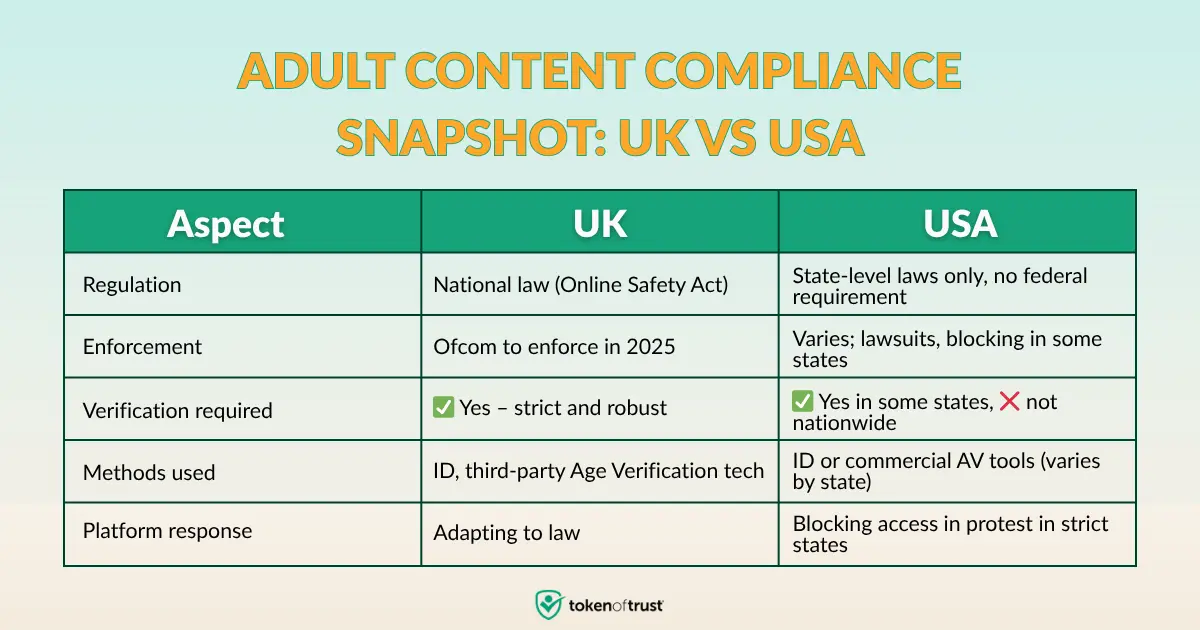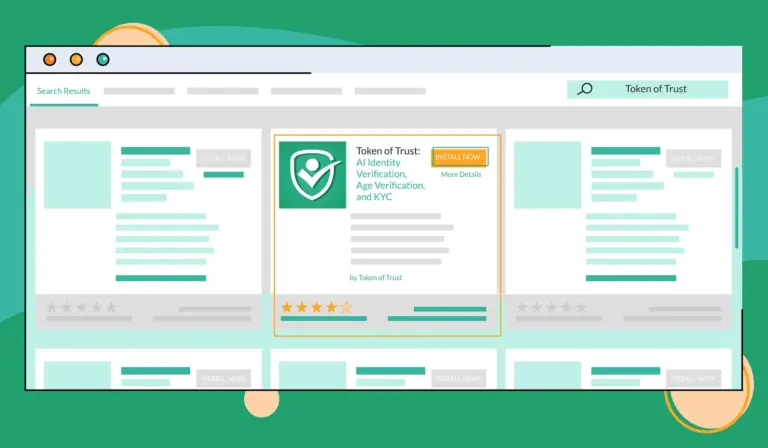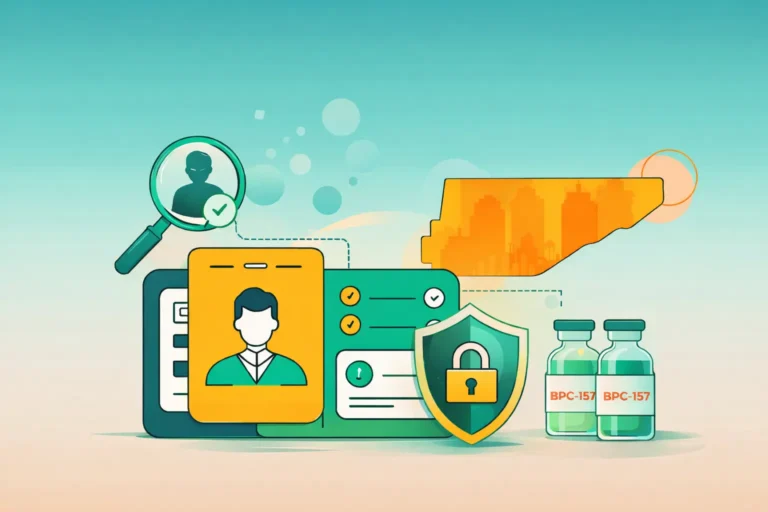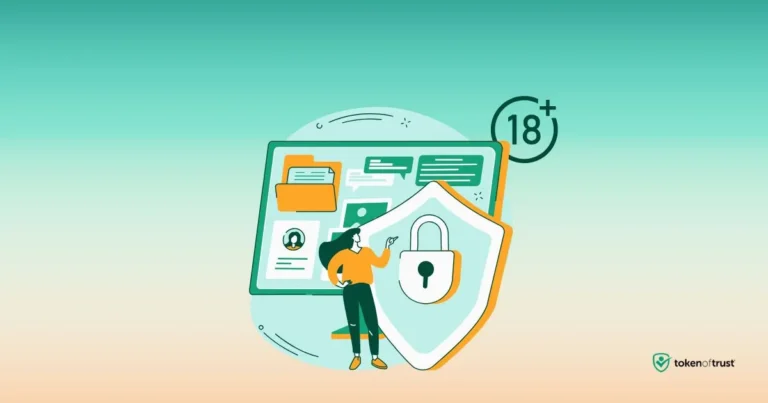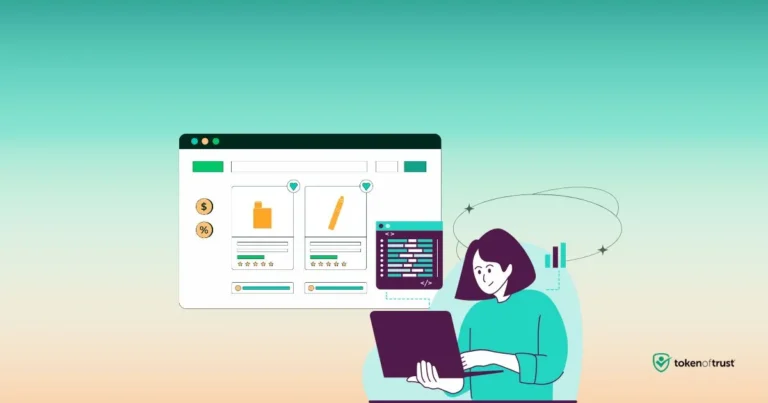Age Verification for Adult Content: UK vs US Laws 2025
As governments crack down on underage access, age verification for adult content is becoming a legal necessity. But while both the UK and US are pushing for stricter controls, they’re taking very different approaches—leaving platforms uncertain about what compliance actually requires.
This guide breaks down the regulatory landscape, highlights key enforcement actions, and outlines how adult content providers can adapt responsibly in 2025.
UK: Government-Mandated Age Assurance Is Now in Effect
Laws and standards:
The Online Safety Act (2023) gives Ofcom (the UK communications regulator) authority to require robust age verification for adult content.
Sites hosting pornographic content accessible in the UK are legally required to prevent children from accessing it, typically through age verification technologies, not just self-declaration (e.g., “I’m 18+”).
Ofcom has published a code of practice with specific requirements, and enforcement (e.g., fines or blocking non-compliant sites) is set to begin in 2025.
Examples of age assurance methods expected:
- Government-issued ID checks (e.g., passport, driver’s license)
- Third-party age verification providers
- Credit card checks are being phased out due to privacy and reliability concerns
Privacy consideration:
UK regulators stress data minimization and anonymity-preserving technologies—no central porn ID database.
USA: State-Level Age Checks Create Legal Patchwork
Unlike the UK, the U.S. does not have a federal law requiring age verification for accessing adult content. Instead, the legal landscape is fragmented—shaped by a growing number of state-level laws.
Several states—including Louisiana, Utah, Virginia, Mississippi, and Texas—have enacted legislation mandating age verification for pornographic websites. These laws typically require platforms to implement “reasonable” measures, such as ID checks or third-party verification services.
However, most states have no such laws in place. As a result, many adult sites still rely on honor-system tactics like basic “I’m 18+” popups—leaving both users and businesses exposed to risk.
What that means in practice:
- There is no federal requirement for age verification across adult content sites
- 16+ states now require some form of age verification, with varying enforcement mechanisms
- Non-compliant sites in these states may face lawsuits or access blocks
- Major platforms like Pornhub have protested by blocking access in states with strict mandates
The result is a compliance minefield. Without a unified national standard, platforms must navigate a patchwork of inconsistent laws—driving up legal risk and operational complexity.
Accepted Age Verification Methods
| Method | UK | US (State-Dependent) |
| Government-issued ID check | ✅ Expected | ✅ Often accepted |
| Biometric facial estimation | ✅ If privacy-preserving | ❌ Rarely accepted |
| Credit card checks | ❌ Phased out | ✅ Sometimes allowed |
| Third-party AV provider | ✅ Common | ✅ Common |
| Self-declared “I’m 18+” | ❌ Not compliant | ❌ Not compliant (in AV states) |
U.S. States with Active Age Verification Laws for Porn Sites
| State | Law / Bill & Effective Date | Key Verification Requirements |
| Louisiana | Act 440 (Jan 1, 2023)HB 77 (Aug 1, 2023) | Gov’t ID or 3rd-party AV for sites with ≥33% adult content; 30-day notice before fines |
| Utah | SB 287 (May 3, 2023) | ID or facial-scan; private lawsuits allowed |
| Arkansas | SB 66 (July 31, 2023) | Reasonable age verification required before access; liability for distribution if not implemented |
| Virginia | SB 1515 (July 1, 2023) | AV required before access; ID or biometric verification allowed; liability if not implemented |
| Montana | SB 544 (Jan 1, 2024) | Digitized ID or transactional AV; civil liability |
| North Carolina | HB 8 (Jan 1, 2024) | Similar to VA; commercial AV tools required |
| Indiana | SB 17 (Aug 16, 2024) | “Reasonable” age verification required |
| Idaho | HB 498 (July 1, 2024) | Reasonable AV required |
| Kansas | SB 394 (July 1, 2024) | Verification for ≥25% harmful content |
| Kentucky | HB 278 (July 15, 2024) | Civil enforcement with ID or database checks |
| Nebraska | LB 1092 (July 2024) | Gov’t ID or commercial AV; civil liability |
| Mississippi | SB 2346 (July 1, 2023) | State-approved digital ID or 3rd-party AV |
| Oklahoma | SB 1959 (Nov 1, 2024) | Verification required before access |
| South Carolina | HB 3424 (Jan 1, 2025) | Same model as VA/KY/NE |
| Florida | HB 3 (Jan 1, 2025) | AV required; site is liable if bypassed |
| Tennessee | SB 1792 (Jan 1, 2025) | Law upheld; enforced while in litigation |
| Texas | HB 1181 (Sept 19, 2023)HB 18 (Sept 1, 2024) | Upheld by Supreme Court; ID + warning labels |
| Georgia | SB 351 (July 1, 2025) | Follows same AV template |
| South Dakota | HB 1053 (July 1, 2025) | Applies to any site with “harmful to minors” content |
| Wyoming | HB 43 (July 1, 2025) | AV required for all adult content |
| North Dakota | HB 1561 (Aug 1, 2025)SB 2380 (Aug 1, 2026) | Scheduled enforcement August 1, 2025 |
| Alabama | HB164 (October 1, 2024) | AV required, no data retention, mandatory health warning, penalties enforced |
| Missouri | Missouri 15 CSR 60-18 (May 7, 2025) | Specific AV rule – applicable to adult sites |
| Arizona | HB 2112 (Sept. 25, 2025) | Likely includes AV + content gatekeeping |
In several states (e.g. Texas, Tennessee, Utah, South Carolina), large platforms like Pornhub have blocked access entirely rather than comply, citing privacy or liability concerns.
In Tennessee, a federal judge initially blocked the law over First Amendment concerns, but an appeals court later reversed that decision, allowing enforcement to proceed while the case moves through the courts.
Last June 2025, the U.S. Supreme Court upheld Texas’s HB 1181 in a 6–3 ruling, marking a precedent that such laws don’t unconstitutionally hinder adult speech.
Opponents argue these laws—especially ID scans or facial verification—create privacy risks, may push users to less-regulated platforms, and raise concerns about digital inequality.
How Platforms Are Adapting to Age Verification Laws in the UK and US
- UK-based and international platforms are preparing for Ofcom enforcement by vetting privacy-first verification tools and building age gates that don’t harm UX.
- In the US, operators are now in a patchwork environment—where some states require full compliance, while others allow self-attestation.
- Many platforms are turning to third-party verification providers like Token of Trust to standardize implementation across jurisdictions and protect user privacy.
Need Help Navigating UK or US Age Verification Laws?
Token of Trust helps adult content providers implement region-compliant, privacy-first verification solutions—without storing sensitive user data. Whether you’re facing legal exposure in the US or adapting to the Online Safety Act, we’ll help you stay compliant and customer-friendly.
👉 Talk to a compliance expert today
This guide reflects regulatory information available as of August 2025. Legal requirements may change, and businesses should consult legal counsel to ensure compliance in their operating regions.